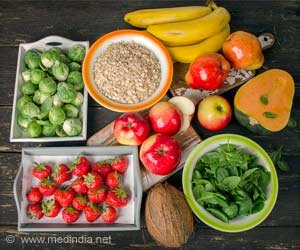Higher Hip Fracture Risk in Vegetarians

Individuals in the study, who were recruited between 2006 and 2010, provided information on their diet and were classified as either regular meat eaters who ate meat five or more times a week; occasional meat eaters who ate meat fewer than five times a week; a pescatarian who ate fish but not meat; or a vegetarian who could consume dairy foods but not fish or meat.
Individual data was connected to hospital records, and hip fractures were tracked during the follow-up period until 2021.
Vegetarian Diet Linked to Higher Hip Fracture Risk
There were 3503 instances of hip fracture among the 413,914 individuals, for an overall incidence rate of less than 1% (0.8%). Although the overall risk of hip fracture was modest, there was a significant difference in risk between vegetarians and regular meat eaters. The researchers discovered:
- Regardless of gender, vegetarians have a 50% higher risk than regular meat eaters.
- The danger was the same for occasional and regular meat eaters.
- Pescatarians had a little higher risk (8%) than typical meat eaters, but the difference was not statistically significant.
Implications of Hip Fracture Risk Among Different Dietary Groups
The researchers evaluated how these relative disparities may transfer to real-world situations. They anticipated that 6.5 regular meat eaters and 6.5 occasional meat eaters will get a hip fracture on average, while 7 pescatarians and 9.5 vegetarians would.
Advertisement
“Hip fractures are a growing problem in an ageing society, and can trigger debilitating health conditions and a loss of quality of life,” said James Webster, a Ph.D. researcher in the School of Food Science and Nutrition who conducted the study. “This study found that, while vegetarians have a 50% higher risk of hip fracture than meat eaters, this translates to only 3 more hip fractures per 1000 people over 10 years. The health benefits of a vegetarian diet, including a lower risk of cancer and cardiovascular disease, may still outweigh any increases in hip fracture risk. Our analysis suggests that low BMI may be a key factor in why their risk is higher. Additionally, vegetarians were about 17% less likely to meet protein recommendations than meat-eaters. So, important messages from our study are that vegetarians need to ensure they are getting a balanced diet with enough protein and maintaining a healthy BMI. This will help vegetarians to maintain healthy bones and muscles.”
Professor Janet Cade, who leads the Nutritional Epidemiology Group at the University of Leeds and supervised the research, said: “Hip fracture is a major health issue and diet may have a part to play in affecting risk.
“This research, using the large UK Biobank, confirms our previous work, showing that a vegetarian diet increases the risk of hip fracture compared to regular meat eaters, in both men and women. Whilst vegetarian diets have health benefits, understanding diet quality and the balance of key nutrients may help to reduce risk and improve future bone health.”
Hip fractures cost the NHS between £2-3 billion annually.
References:
- Webster, J., Greenwood, D.C. & Cade, J.E. Risk of hip fracture in meat-eaters, pescatarians, and vegetarians: a prospective cohort study of 413,914 UK Biobank participants. BMC Med 21, 278 (2023). https:doi.org/10.1186/s12916-023-02993-6
Source: Medindia
Source link
#Higher #Hip #Fracture #Risk #Vegetarians



